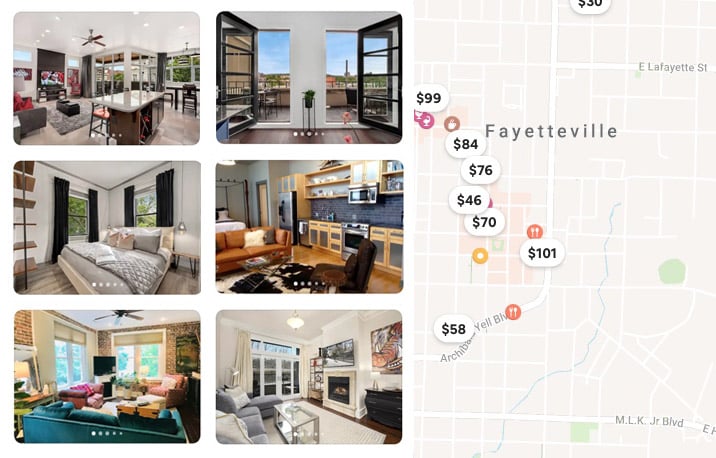
FAYETTEVILLE — People who rent homes in the city through sites like Airbnb and VRBO have an extra three months to come into compliance with the new short-term rental law.
The City Council on Tuesday approved a second extension of the grace period which allows people to get approved without having to go through a Planning Commission hearing or paying for a conditional use permit.
The grace period was originally set to expire Nov. 21, but the council extended the deadline to Feb. 21. The grace period now ends on May 21, which means owners of short-term rentals will have had an entire year to become compliant with the new law.
The rules
The new rules require operators of short-term rentals to get a business license and a safety inspection to operate legally in Fayetteville.
Short-term rentals are categorized as either Type 1 or Type 2.
Type 1 rentals are homes that the owners live in, but sometimes rent out rooms or the entire house to guests when they’re out of town. Accessory dwelling units also count as Type 1 properties.
Type 2 rentals are rented all year, and have no owners living in them.
Owners of both types must pay the city’s 2% hotel, motel and restaurant (HMR) tax, and are required to obtain vacation rental or short-term rental insurance coverage. They must also designate a representative who can be at the unit within three hours in case of an emergency.
Type 2 owners have an additional requirement, which is to obtain a conditional use permit from the Planning Commission.
The law also states that no more than 2% of all residential units in Fayetteville can be Type 2 rentals.
Recent changes
The council last month made two changes to the new rules.
The first change allows short-term rentals in nonresidential zoning districts that don’t already permit hotels or motels. The second change removed a density cap on short-term rentals operating in multifamily buildings.
Start-up period
The ordinance went into effect May 21, 2021 but the council included a six-month start-up period for operators to come into compliance without going through the Planning Commission hearing process and paying the $100 conditional use permit fee.
That six-month deadline was Nov. 21, but city staff asked the council to extend the start-up period by three months to Feb. 21, 2022. The council agreed, but on Tuesday extended it again until May 21, 2022.
Why another extension?
The new extension was sponsored by Council Member Sarah Bunch who said she’s heard from several residents who have been going through the permitting process, but who are worried that they still won’t have their permit before the deadline.
Some of those people, she said, have already gone through the inspection process and were required to make repairs or upgrades to their properties. Some repairs, such as cracks in chimneys, can take a while to complete before a second inspection is scheduled, she said.
Bunch said she hopes the extra time can help those people who are actively working to come into compliance.
“They really are trying to do the right thing here,” she said.
City planners estimate there are between 500-600 homes being used as short-term housing for visitors in Fayetteville, but as of last week, only 423 applications had been submitted, of which 204 have been approved.
How to apply
Business licenses for short-term rentals may be applied for online at egov.fayetteville-ar.gov.
The following information is required:
- Physical street address of the rental property.
- The type and total number of dwelling units located on the lot containing the STR unit.
- If the owner is not the own agent, the owner-designated agent’s information, including legal name, mailing address, immediate contact phone number and immediate contact e-mail address.
- Documentation of approval of a life safety and egress inspection by the city’s Building Safety Division for the rental unit
- Proof of vacation rental or STR insurance coverage.
- Proof of application for remittance of the city’s hotel, motel and restaurant (HMR) tax, and verification that all sales, use, and HMR taxes are current.
- An approved conditional use permit for Type 2 units licensed (not required before Feb. 21, 2022).
All short-term rental operators also need to register with the city’s new Landlord’s Representative Registry.

